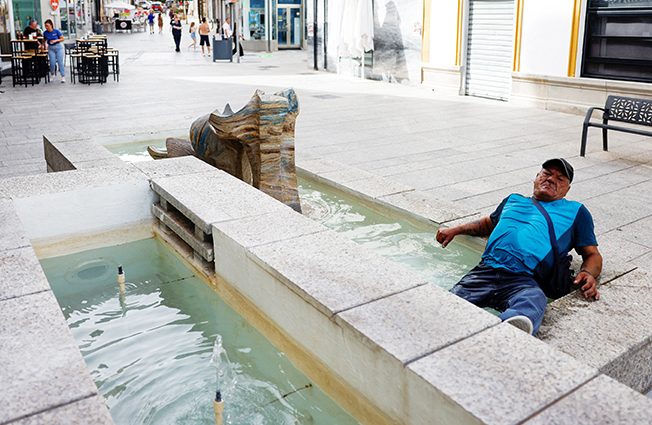Spain headed for its hottest early summer temperatures in four decades on Friday, one area of France banned outdoor events, and drought stalked Italian farmers as a heatwave sent Europeans hunting for shade and fretting over climate change.
Such was the heat that England’s upscale Royal Ascot Racecourse even saw a rare change of protocol: guests were allowed to shed hats and jackets once the royals had passed.
“Avoid over-exposing to the sun, hydrate and take care of the most vulnerable so they don’t suffer from heat stroke,” was the advice from Spanish Prime Minister Pedro Sanchez in Madrid during an event, fittingly, about desertification.
Temperatures were due to reach 40 to 42 degrees Celsius (104-108 Fahrenheit) in Madrid and Zaragoza, in central and eastern Spain respectively, the national weather agency AEMET said. Those would be levels not seen so early in the year since 1981.
Northern Italian regions risk losing up to half their agricultural output due to a drought, a farm lobby said, as lakes and rivers start to run dangerously low, jeopardising irrigation. Read full story
The federation of Italian utility companies, Utilitalia, warned this week that the country’s longest river, the Po, was experiencing its worst drought for 70 years, leaving many sections of the vast, northern waterway completely dried up.
In France, the Gironde department around Bordeaux prohibited public events including concerts and those at indoor venues without air conditioning, a local official told public radio. Read full story
‘EVERYONE FACES A HEALTH RISK’
Temperatures in many of France’s areas hit 40 C for the first time this year on Thursday and were expected to peak on Saturday, climbing to 41-42 C.
“Everyone now faces a health risk,” local prefect Fabienne Buccio told France Bleu radio.
A spokesperson for the United Kingdom’s weather service said that Friday was likely to top Wednesday’s hottest day of the year so far of 28.2 degrees C, with 34 expected in some parts of the southeast. Parks and pools were packed.
Mediterranean nations are more-and-more worried about how climate change may affect their economies and lives.
“The Iberian peninsula is an increasingly dry area and our rivers’ flow is slower and slower,” Spanish leader Sanchez added.
Firefighters were battling wildfires in several parts of Spain, with Catalonia in eastern Spain and Zamora near the western border with Portugal the worst hit.
In Zamora, between 8,500 and 9,500 hectares turned to ashes.
The cloud of hot air was sparing Portugal on Friday, where temperatures were not as high as in other European nations, with Lisbon likely to reach 27 C.
However, last month was the hottest May in 92 years, said Portugal’s weather agency IPMA, warning that most of the territory is suffering from a severe drought.
Portugal’s reservoirs have low water levels, with the Bravura dam of the most affected at only 15% full.







Click here to change your cookie preferences